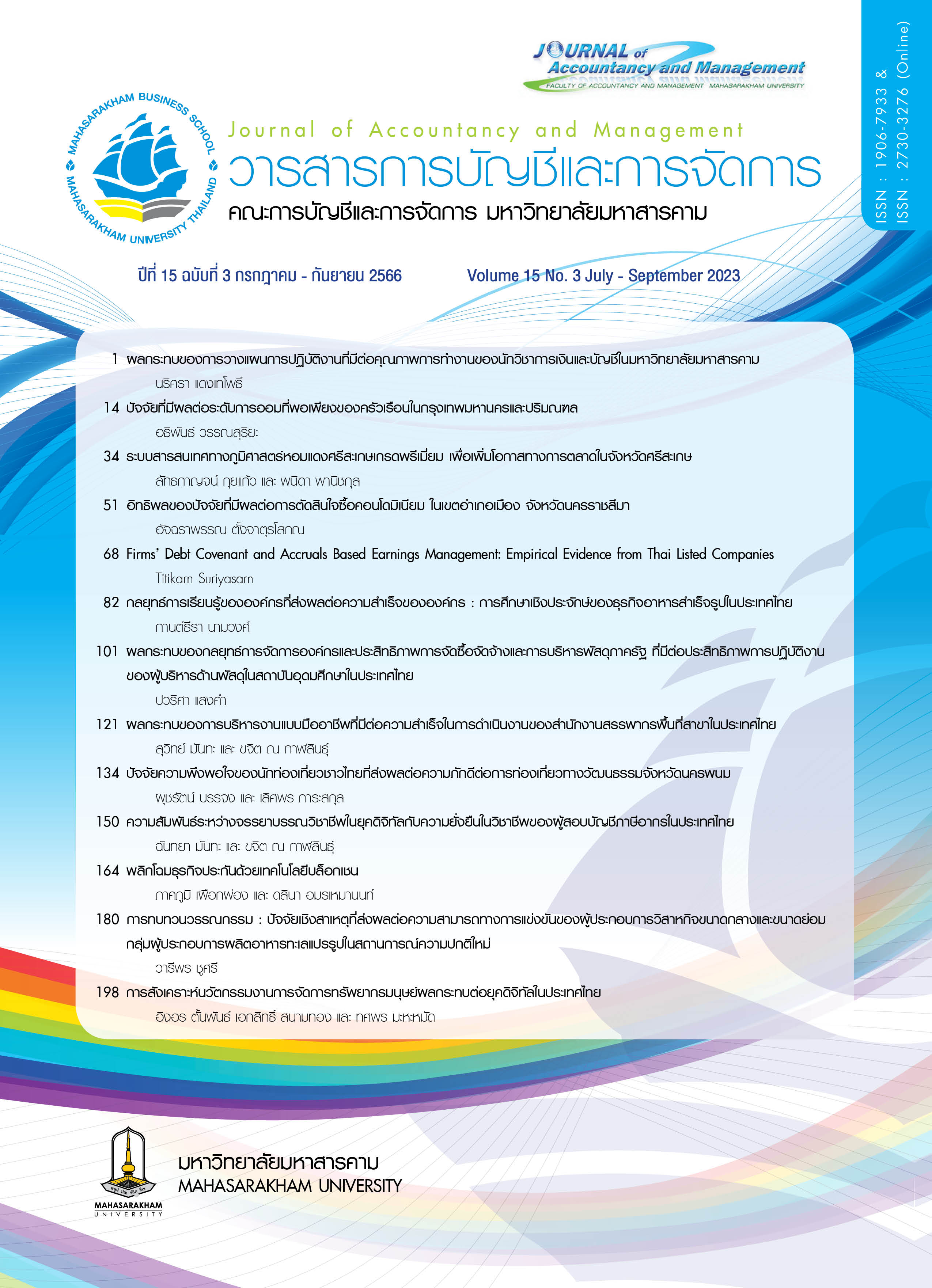Firms' Debt Covenant and Accruals Based Earnings Management: Empirical Evidence from Thai Listed Companies
Main Article Content
บทคัดย่อ
This research aims to investigate firms' debt covenant and accruals-based earnings management through the earnings management discretion in order to maintain the terms of the loan agreement of firms listed in the Stock Exchange of Thailand. The data samples are 1,772 firms collected from 2014 to 2018. Multiple regression is employed to test the hypotheses. The results show that an increasing in debt covenant was a positive relationship to accruals-based earnings management of Thai listed firms. In addition, MAI listed firms have accruals-based earnings management more than Thai-listed firms. Management level has incentives regarding to debt covenants profits, management, posted on an accrual basis of listed firms.
Downloads
Article Details

อนุญาตภายใต้เงื่อนไข Creative Commons Attribution-NonCommercial-NoDerivatives 4.0 International License.
บทความที่ได้รับการตีพิมพ์เป็นลิขสิทธิ์ของวารสารการบัญชีและการจัดการ
ข้อความที่ปรากฏในบทความแต่ละเรื่องในวารสารวิชาการเล่มนี้เป็นความคิดเห็นส่วนตัวของผู้เขียนแต่ละท่านไม่เกี่ยวข้องกับมหาวิทยาลัยมหาสารคาม และคณาจารย์ท่านอื่นๆในมหาวิทยาลัยฯ แต่อย่างใด ความรับผิดชอบองค์ประกอบทั้งหมดของบทความแต่ละเรื่องเป็นของผู้เขียนแต่ละท่าน หากมีความผิดพลาดใดๆ ผู้เขียนแต่ละท่านจะรับผิดชอบบทความของตนเองแต่ผู้เดียว
เอกสารอ้างอิง
Ahmed, M. G., Ganesan Y., & Hashim, F. (2021). Antecedents and consequence of governance characteristics, earnings management, and company performance: An empirical study in Iraq. Journal of Asian Finance, Economics, and Business, 8(8), 57-66.
Astarmi, E. W., & Tower, G. (2006). Accounting policy choice and firm characteristics in the Asia Pacific region: An international empirical test of costly contracting theory. The International Journal of Accounting, 41(1), 1-21.
Becker, C. L., Defond, M. L., Jiambalvo, J., & Subramanyam, K. R. (1998). The effect of audit quality on earnings management. Contemporary Accounting Research, 15(1),1-24.
Bottares, J., Ekasingh, E., & Sarapaivanich, N. (2018). Relationship between auditor reports and earning quality of companies listed on the stock exchange of Thailand. Journal of Accountancy and Management, Mahasarakham Business School, Mahasarakham University, 10(4), 183-197.
Bumrungyat, N., & Sutthachai, S. (2016). A relationship between real activities earnings management and debt covenant maintenance of listed companies in the stock exchange of Thailand. NIDA Business Journal, 19, 94-114.
Chansarn, T. (2015). The relationship between debt and earnings quality of listed companies in market for alternative investment (MAI) of Thailand. BU Academic Review, 14(1),71-87.
Chatwong, T. (2017). Accounting theory research: from the past to the future. Journal of Business Administration The Association of Private Education Institutions of Thailand, 6(2), 203-212.
Chiengtong, A. (2010). A study of relationship between earing management and debt covenant maintenance : A case study of listed companies in the stock exchange of Thailand. Master's thesis of Burapha University.
Davidson, R. A., & Neu, D. (1993). A note on the association between audit firm size and audit quality. Contemporary Accounting Research, 9(2), 479-488.
Davidson, W. N., Jiraporn, P., & DaDalt, P. (2006). Causes and consequences of audit shopping: An analysis of auditor opinions, earnings management, and auditor changes. Quarterly Journal of Business and Economics, 45(1/2), 69-87.
Dechow, P. M., Sloan, R. G., & Sweeney, A. P. (1995). Detecting earnings management. The Accounting Review, 70(2), 193-225.
Frankel, R. M., Johnson, M. F., & Nelson, K. K. (2002). The relation between auditors' fees for non audit services and earnings management. Accounting Review, 77(1), 71-105.
Healy, P. M., & Wahlen, J. M.(1999). A review of the earnings management literature and its implications for standard setting. Accounting Horizons, 13(4), 365-383.
Hribar, P., & Collins, D. W., (2002). Errors in estimating accruals: implications for empirical research. Journal of Accounting Research, 40(1), 105-134.
Jones, J. J. (1991). Earnings management during import relief investigation. Journal of Accounting Research, 29(2), 193-228.
Ketsuwan, P. (2012). Real activities manipulation earning target incentive to engage in earning management. Journal of Federation of Accounting Professions, 8(22), 89-92.
Krishnan, G. V. (2003). Does big 6 auditor industry expertise constrain earnings management. Accounting Horizons, 17, 1-16.
Kulroop, D., Xu, Y., Xie, S., Fu, G., & Yang, Y. (2019). Earnings management: A comparative literature review between China and Thailand. Journal of Modern Management Science, 12(2), 83-104.
Lambert, R. A. (2001). Contracting theory and accounting. Journal of Accounting and Economics, 32, 3-87. The Stock Exchange of Thailand.(2020). Listed on company the stock exchange. Retrieved September 12, 2020, from https://www.set.or.th/set/commonslookup.do?language=th&country=TH.
Truong, K. D. (2021). Firm characteristics and cash holdings speed of adjustment: Evidence from Vietnam. Journal of Asian Finance, Economics and Business, 8(8), 137-148. https://doi:10.13106/jafeb.2021.vol8.no8.0137
Vilalai, P., Petchchedchoo, P., & Kumsuprom, S. (2020). Real earnings management and accrual-based earnings management implications for future profitability. Journal of Accountancy and Management, Mahasarakham Business School, Mahasarakham University, 12(3), 83-96.
Watts, R. L., & Zimmerman, J. L.(1986). Positive accounting theory. London : Prentice-hall Inc.


